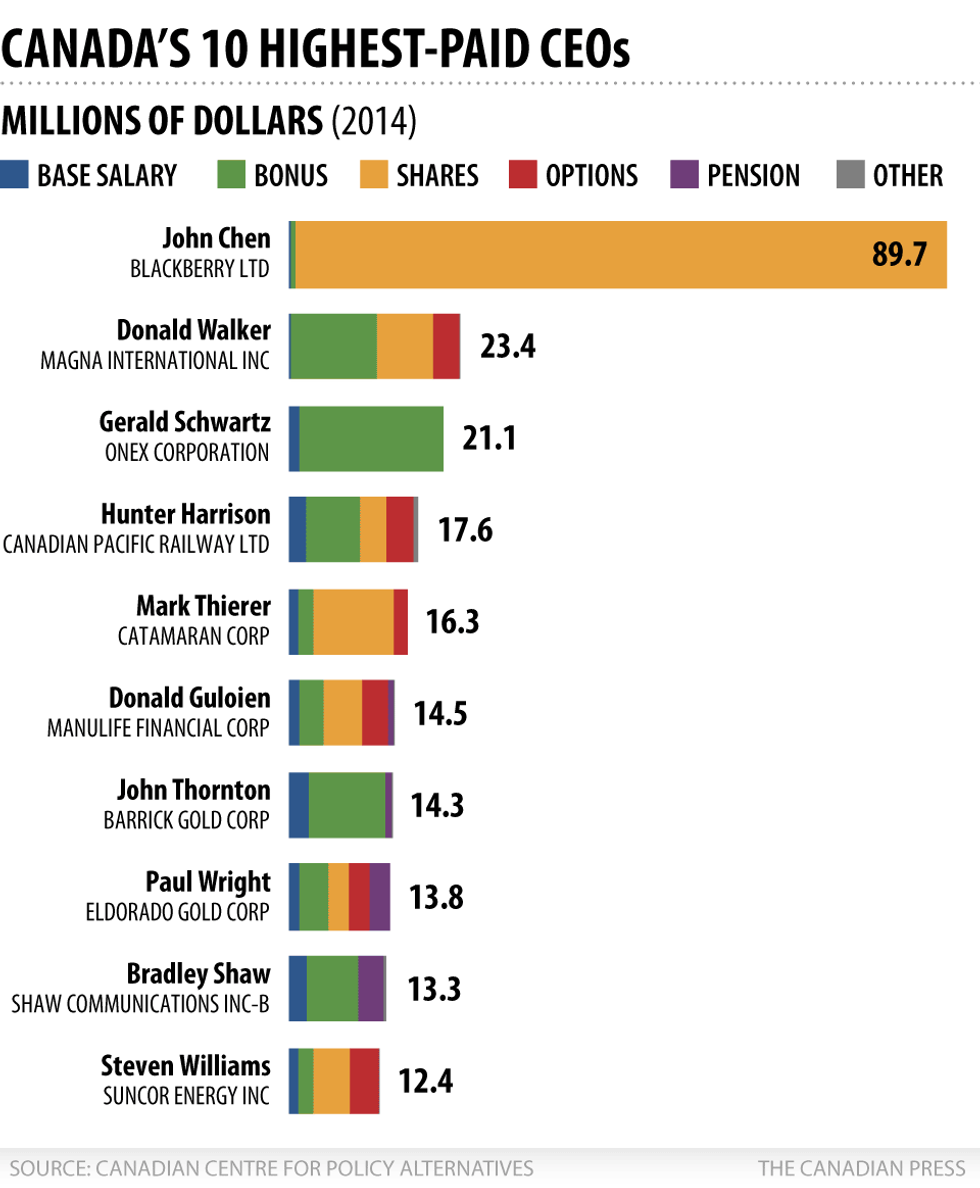By lunchtime Monday, Canada's top chief executives had already banked an average worker's annual salary.
To put that another way, in 2014, the country's top-paid CEOs took home 184 times as much as the average Canadian worker, according to an annual report on publicly-traded companies released Monday by the Canadian Centre for Policy Alternatives.
According to the report, the average take-home for a CEO in the country was $8.96 million, accumulated through salaries, stock options, bonuses, and share grants. Meanwhile, the average worker earned a total of $48,636, while the average minimum wage worker got $22,010.
"What really struck me more than anything else--given the fact that the Canadian economy was already quite weak and commodity prices were already deteriorating in 2014--was the resilience of CEO compensation," the report's author, research associate Hugh Mackenzie, told The Star on Monday. "My general suspicion is that all these things are ways of paying people more without people being able to figure out exactly how much."
Although executive paychecks dipped slightly in 2014 from the previous year, the report, Staying Power: CEO Pay in Canada (pdf), also found that CEO compensation climbed by 25 percent between 2008 and 2013.
Meanwhile, the average worker's salary increased by just 11 percent.
"When you adjust 1998 income for inflation, an even more dramatic picture emerges of how wide the gap between the top 100 CEOs in Canada and the rest of us has become," Mackenzie wrote. "Adjusted for inflation, the average income of the top 100 CEOs has increased by 89% since 1998, while the average Canadian income grew by 8%. We should keep in mind that this income boom continued through a deep recession from which Canada has yet to fully emerge."
While the average CEO salary hovered around $9 million, the highest-paid executives surpassed that by astronomical amounts. Number one on the list was John Chen of Blackberry, who took home $89.7 million. Chen's base salary was significantly lower than other executives included in the survey, but his shares in the company were worth $88 million, making up the vast majority of his total compensation.
Second place went to Donald Walker, who had a similarly low base salary--$358,924, slightly higher than Chen's $341,452--but likewise raked in a chunk of his overall pay from company shares, which made up $11.6 million of his $24 million take-home. Other rewards filled in the rest.
As Mackenzie explains, bonus-heavy compensation packages are used to pay CEOs for performances over which, in reality, they have little control.
"Most of the compensation of these executives is not based on how their companies performed in the real markets that they actually have some ability to influence," he told the Star. "It's based on the performance of the shares of the company in a market in which the executive can't control at all.... The criteria that drive the incentive-based compensation, you would think, ought to be based on how the company does based on those same comparables but it doesn't."
Prime Minister Justin Trudeau pledged during his election campaign to raise taxes on the super-rich in order to lower them for the middle class and close loopholes that allow CEOs to avoid paying full taxes on their pay by taking it from stock options, which are taxed lower than salaries.
In fact, Mackenzie says, reforming the tax loophole alone would "expressly discourage" the deceptive method of equity-based compensation.
"If we, as a society, have concluded that excessive pay is unacceptable, we should be able to claw back a greater portion of it from the recipients, and structure the tax system to discourage corporations from paying those excessive amounts," he concluded.




